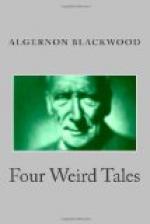“She’s got a face of the same sort, that Statham horror,” his wife said with a shiver. “Reduce the size, and paint in awful black eyes, and you’ve got her exactly—a living idol.” And all three laughed, yet a laughter without merriment in it.
“And you spoke to the man?”
“I did,” the Englishman answered, “though I confess I’m a bit ashamed of the way I spoke. Fact is, I was excited, thunderingly excited, and felt a kind of anger. I wanted to kick the beggar for practising such bally rubbish, and in such a place too. Yet all the time—well, well, I believe it was sheer funk now,” he laughed; “for I felt uncommonly queer out there in the dusk, alone with—with that kind of business; and I was angry with myself for feeling it. Anyhow, I went up—I’d lost my donkey boy as well, remember—and slated him like a dog. I can’t remember what I said exactly—only that he stood and stared at me in silence. That made it worse—seemed twice as real then. The beggar said no single word the whole time. He signed to me with one hand to clear out. And then, suddenly out of nothing—she—that woman—appeared and stood beside him. I never saw her come. She must have been behind some boulder or other, for she simply rose out of the ground. She stood there and stared at me too—bang in the face. She was turned towards the sunset—what was left of it in the west—and her black eyes shone like—ugh! I can’t describe it—it was shocking.”
“She spoke?”
“She said five words—and her voice—it’ll make you laugh—it was metallic like a gong: ‘You are in danger here.’ That’s all she said. I simply turned and cleared out as fast as ever I could. But I had to go on foot. My donkey had followed its boy long before. I tell you—smile as you may—my blood was all curdled for an hour afterwards.”
Then he explained that he felt some kind of explanation or apology was due, since the couple lodged in his own hotel, and how he approached the man in the smoking-room after dinner. A conversation resulted—the man was quite intelligent after all—of which only one sentence had remained in his mind.
“Perhaps you can explain it, Felix. I wrote it down, as well as I could remember. The rest confused me beyond words or memory; though I must confess it did not seem—well, not utter rot exactly. It was about astrology and rituals and the worship of the old Egyptians, and I don’t know what else besides. Only, he made it intelligible and almost sensible, if only I could have got the hang of the thing enough to remember it. You know,” he added, as though believing in spite of himself, “there is a lot of that wonderful old Egyptian religious business still hanging about in the atmosphere of this place, say what you like.”
“But this sentence?” Henriot asked. And the other went off to get a note-book where he had written it down.




